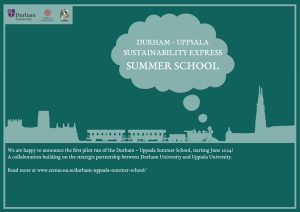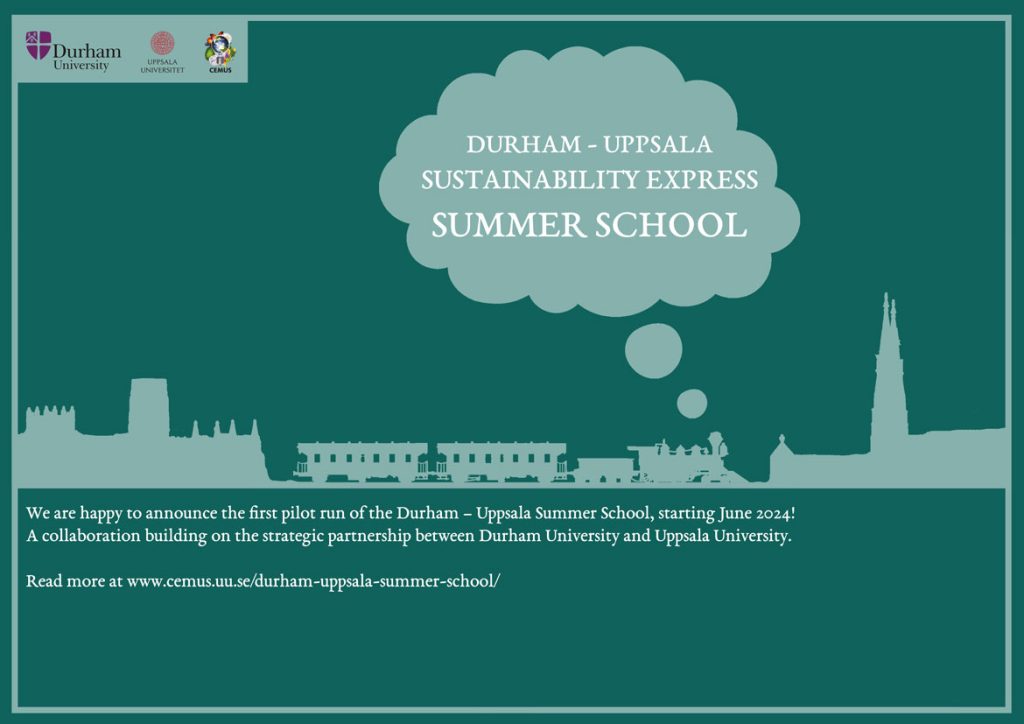
We are happy to announce the first pilot run of the Durham – Uppsala Summer School, starting June 2024! A collaboration building on the strategic partnership between Durham University and Uppsala University.
When: June 3-9, 2024
Where: Uppsala, Sweden
Contact: Daniel Mossberg, CEMUS, Uppsala University +46-730650228 and Robert Song, Professor, Durham University
As part of the strategic partnership between Durham and Uppsala, a delegation visited Uppsala on 22-23 November 2023 to explore potential research and education collaborations between our two institutions. Several possibilities for research collaboration emerged from this, and one immediate educational outcome for a joint Durham – Uppsala summer school, based on the Durham Arts and Humanities Faculty commitment to teaching in the environmental humanities as part of its strategic commitment to Transformative Humanities, in order to strengthen further Durham and Uppsala’s education collaborations.
Concept
The summer school on environmental sustainability and the environmental humanities for Masters’ and doctoral level students to be held jointly with Uppsala students, held each summer for one week in Uppsala and one week in Durham. During 2024 a first pilot run is conducted with students and faculty from Durham travelling to Uppsala for a week.
Partner institutions
At Durham University the network for environmental humanities gathers together a wide range of staff across the arts and humanities and social sciences researching and teaching in the environmental humanities and delivers an MA for Environmental Humanities housed in the Arts and Humanities Faculty. At Uppsala University the Centre for Environment and Development Studies, CEMUS, have a long-standing centre devoted to interdisciplinary education as well as research and collaboration. Its particular emphasis is student-initiated education, in which students design courses to be taken for credit.
The summer school would be held with students studying together in both Uppsala and Durham. Some of the education would be classroom-based, while some would be field-based in and around Uppsala and Durham, with possible study visits and field trips. One distinguishing feature of this would be travelling by train between Durham and Uppsala. Although air travel is the customary means of transport because it is both quicker and cheaper, travelling by train allows students to make the journey itself part of the education: some of the travel time would be actively devoted to shared learning, and the different experience of space and time that results, models a slower, more engaged relationship with the environment, as well as being less carbon intensive.
Learning outcomes
For students, while the summer school would not be credit-bearing, the educational benefits would include experience of cross-cultural education, learning from peers, and understanding how environmental issues are understood and approached in different geographical contexts. Drawing on CEMUS’s student-initiated emphasis, we also propose that students from Uppsala and Durham work together in the months leading up to the summer school to design a programme which would reflect their shared interests and would help them develop pedagogically-related skills in communication, digital literacy, group work, course design, and project development.

